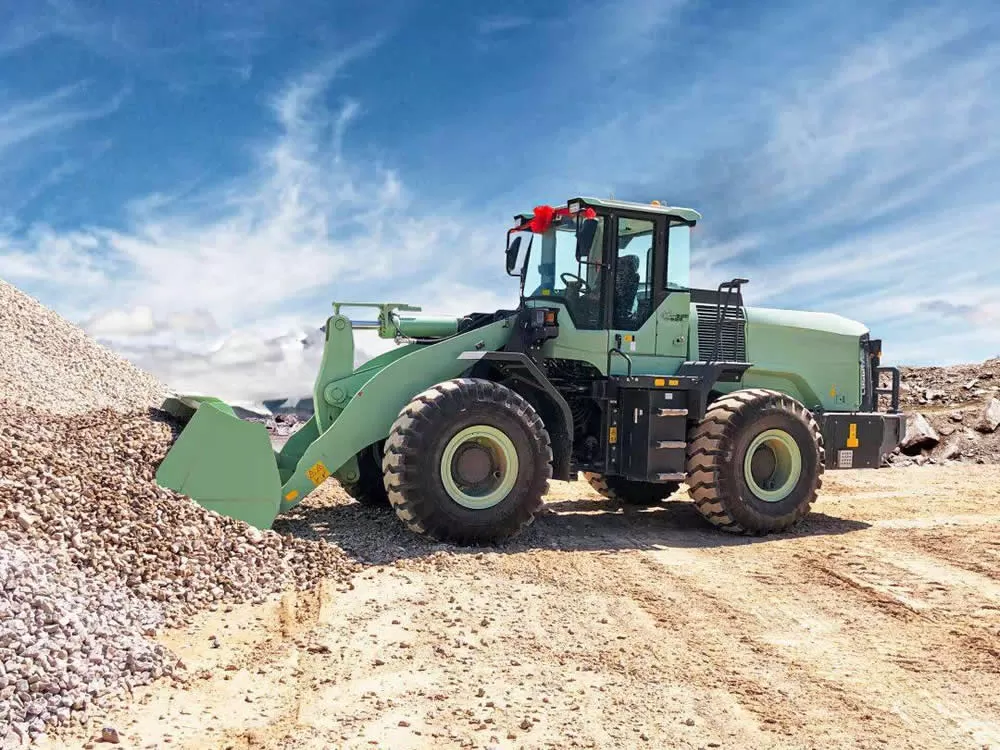
With the advancement of battery power technology, electric loaders have gained significant interest in the loader industry. Electric loaders utilize an electric drive system powered by high-performance lithium-ion batteries. The electric motor provides both propulsion and hydraulic power, replacing traditional diesel engines. This enables zero-emission, low-noise, and highly efficient operation.
Zero Emissions and Environmentally Friendly Quietness: No tailpipe emissions significantly reduce CO2 and NOx emissions, and operating noise is significantly lower than that of diesel engines, making them suitable for urban construction, tunnels, and indoor environments.
High Energy Efficiency and Instant Response: The electric motor boasts an energy conversion efficiency exceeding 90%, delivering instantaneous high torque, fast acceleration, and smooth operation.
Low Operating Costs: Despite the higher purchase cost, electricity costs are significantly lower than fuel costs. Maintenance is simple, requiring no oil or filter changes, resulting in a low overall cost of ownership.
Improved Safety and Operator Comfort: Electric loaders offer smoother operation, less vibration, reduced fatigue, and low noise levels, contributing to an improved operating environment and improved work efficiency.
Compatible with Automation and Intelligent Upgrades: Electrification facilitates the integration and development of technologies such as intelligent control systems, adaptive electronic control, and human-machine interfaces (HMIs).
Battery Maintenance
Maintain a suitable charging environment and temperature, avoid deep discharge and overcharging, and regularly check the battery health and temperature control system.
Charging and Infrastructure
Equipped with 240V/50A charging facilities to ensure daily charging efficiency. Midday quick charging is recommended during periods of high daily usage.
Electronic Control and Hydraulic System Maintenance
While engine oil maintenance is not required, regular checks of hydraulic oil, grease, and coolant (if equipped with a water cooling system) are still required to keep the system clean and sealed.
Regular Software Updates and Remote Diagnostics
Leveraging the advantages of the electronic control system, regular firmware upgrades and troubleshooting are performed to improve performance and maintenance efficiency.
|
Features |
Electric loader |
Diesel loader |
|
Acquisition cost |
Higher (approximately RMB 400,000-600,000/5-ton class) |
Low, but high later operating costs |
|
operating costs |
Low electricity costs and minimal maintenance can save up to one million RMB in the five-year life cycle. |
High fuel costs and frequent maintenance |
|
Battery life and refueling/charging |
Requires charging time and infrastructure, suitable for fixed and short-distance applications |
Fast refueling, suitable for long-term and highly flexible operations |
|
performance |
Instant torque output, strong at low speed, simple structure |
Strong continuous high load capacity, suitable for continuous heavy load work |
|
Noise and vibration |
Low |
high |
|
Applicable Scenarios |
Urban, municipal, indoor, sensitive environments |
Long distance, no charging facilities or high-intensity continuous operation |
Continued Cost Decline: Declining lithium battery costs and maturing electrification technology will further enhance the cost-effectiveness of electric loaders.
Accelerated Market Penetration: While the current penetration rate of electric loaders is low, it is rapidly increasing, driven by policy support, environmental protection needs, and cost advantages. The rental market is also increasingly inclined to offer electric equipment.
Larger-Tonnage Product Launches: In addition to compact models, other mid-sized electric loaders have been released, offering performance comparable to diesel loaders and a range of 8–9 hours.
Accelerated Technological Iteration: Dual-motor drive and intelligent scheduling improve propulsion efficiency and lay the foundation for automated and unmanned driving.
Electric loaders are leading the green transformation of the construction industry. With their environmentally friendly, efficient, and low-cost advantages, they are gradually becoming the mainstream of the future. Despite the significant initial investment, rational operation and leasing models significantly shorten the payback period, while also meeting the urgent global demand for sustainable and intelligent construction machinery.
Once you understand the advantages of electric loaders, you will also like to use them for engineering work. Compared with diesel loaders, their convenience is greatly improved in all aspects.